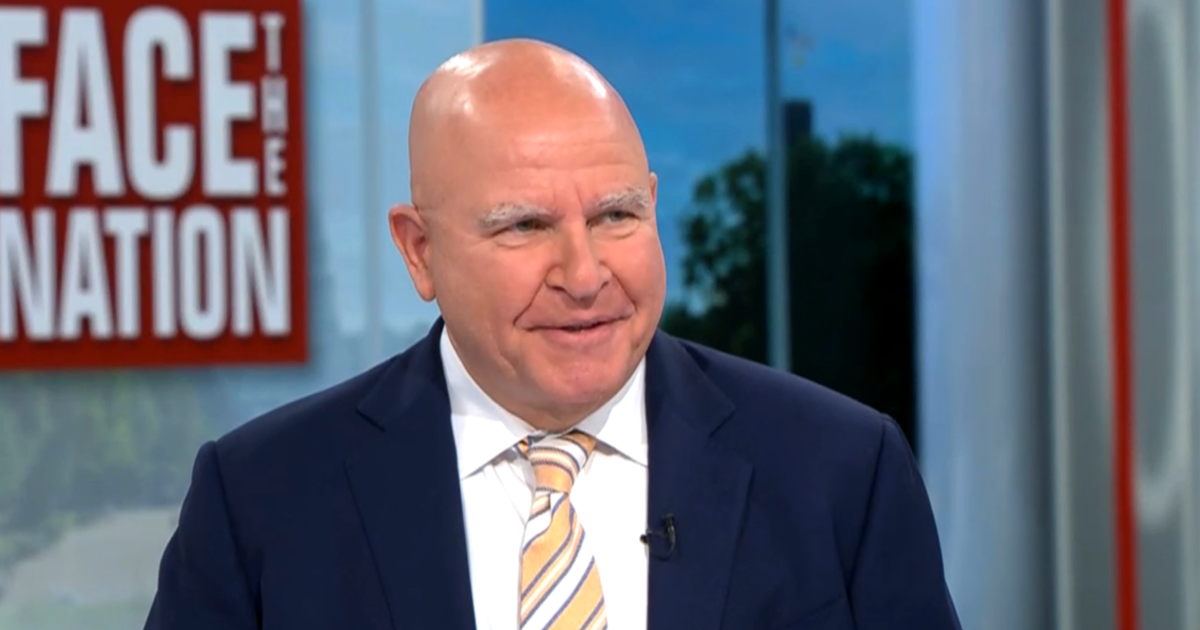Below is a transcript of an interview with H.R. McMaster, former National Security Advisor, on “Face the Nation with Margaret Brennan,” which aired on August 25, 2024.
MARGARET BRENNAN: And we’re joined now by CBS News Foreign Policy and National Security Contributor, retired Lt. Gen. H.R. McMaster. He has a new book out, “At War With Ourselves: My Tour of Duty in the Trump White House,” about his service there as National Security Advisor. Welcome back to the program. Just on the news right now, CENTCOM has about 40,000 U.S. troops in the region, this is really a show of force. How concerned are you about miscalculation and blowback on those U.S. troops?
LT. GENERAL HR MCMASTER: Yes. Well, what I worry about, Margaret, is that those forces are going to be limited in what they can do in response. I think we’ve seen that we’re reluctant to pretend that we know what the return address is for this violence. And of course the return address is Iran. And I think all Americans–
MARGARET BRENNAN: What does that mean exactly?
LT. GENERAL HR MCMASTER: Well, what it means is–
MARGARET BRENNAN: What do you want to do about Iran?
LT. GENERAL HR MCMASTER: Iran is pursuing a strategy where it is willing to waste every Arab life, every Palestinian life, every Lebanese life, in pursuit of its goal of destroying Israel. Meanwhile, Iran continues to funnel weapons, not just into southern Lebanon, but in effect to a proxy army in Syria, into the West Bank. And this is why the Philadelphia Corridor is so important to Israel, to keep Hamas isolated from being supplied by the Iranians as well. At the same time, Iran is in the process of producing a nuclear weapon. So I think we have to recognize that this terrible situation has been going on in the region for 40 years, right? It’s important to remember that Shukr, the- the- the Hezbollah commander, who was- who was killed, and- and- who was- the Hezbollah is now trying to carry out these attacks in retaliation for that. I mean, he was partly responsible for the 1983 bombings, which killed 241 Marines, so in 1983. So this has been going on for decades. And I think the narrative that you hear constantly about lowering the temperature, escalation management, the reluctance to confront Iran directly and impose costs on Iran, actually gives Iran the freedom to escalate on their own terms, with impunity.
MARGARET BRENNAN: Well, this is just one of many extremely serious situations that the next commander in chief is going to face. It’s not going to go away in January. And that’s why I want to pick up on something you wrote in your book. You had a front-row seat. You advised Donald Trump on very sensitive national security issues. You write that he had a hard time distinguishing, quote, “between those who were giving him sound analysis and those, real or imagined, who were giving him tired platitudes.” He said bizarre things like “bomb the drugs” in Mexico, or “why don’t we take out the entire North Korean army during one of their parades?” If Trump is re-elected, can he recruit high-quality advisers who can actually help him make good decisions?
LT. GENERAL HR MCMASTER: Margaret, I think so, particularly in confirmed positions. And if it’s a Trump administration–
MARGARET BRENNAN: Because Congress would prevent him from appointing someone who is not of quality? Is that what you’re saying?
LT. GENERAL HR MCMASTER: Well, yes, I think so. You know, I think so. And- and there are people who are willing to serve, who can help do what we tried to do in that first year. And, you know, the- the story around that first year was all about chaos, but we did a lot. In fact, the story is largely about overcoming that kind of infighting, that- that war with ourselves, to produce policy outcomes that advanced America’s interests. One of those was a dramatic reversal of the Obama administration’s Iran policy, which, unfortunately, the Biden administration has reinstituted.
MARGARET BRENNAN: Well, Iran continued its nuclear development after Trump withdrew from the nuclear deal, against the advice of his secretary of state and his secretary of defense. So–
LT. GENERAL HR MCMASTER: I’m talking more about the lifting of sanctions, Margaret, and the extent to which the failure to enforce Trump-era sanctions has resulted in about $100 billion being transferred to Iran. They’ve used that $100 billion to escalate their proxy wars in the region, from Iraq to Yemen, Syria, Lebanon, and of course Gaza, with the October 7th attacks.
MARGARET BRENNAN: You give specific examples of China’s Xi Jinping, Vladimir Putin, even Israeli Prime Minister Benjamin Netanyahu, manipulating Donald Trump, and you saw it happen. You wrote that “Trump’s lack of historical knowledge made him susceptible to Xi Jinping’s attempts to generate sympathy.” So what’s the scenario you fear? That Donald Trump withdraws U.S. troops from Asia in a second term, or that he brokers a deal to give up Taiwan?
LT. GENERAL HR MCMASTER: Right. Well, I write in the book, Margaret, about this dissonance, you know, that Donald Trump carries with him, these conflicting ideas that he sometimes has a hard time reconciling. And that’s why I think it’s important that he have a competent team around him to help him identify his own agenda. I mean, the story in “At War With Ourselves” is very much my attempt to preserve his independence of judgment, because in every administration there are people who try to manipulate a president into making decisions. They don’t want to give a president options. And what my experience has been, in that first year period when we were making a lot of these major policy changes, is that if you give him the best analysis, if you give him multiple options, it’s in the equation of those options that he can consider the long-term costs and consequences and make informed decisions. And Margaret, who I write about occasionally, also writes in the book that he has a hard time sticking to his decisions. People know exactly how to handle him, especially when it comes to maintaining the full support of his political base.
MARGARET BRENNAN: Manipulate him. You- you also wrote a specific example where Trump wrote a flattering letter to Vladimir Putin in 2018 and it just so happened to be the same time that this poisoning took place on the soil of an American ally by Russia.
LT. GENERAL HR MCMASTER: Right.
MARGARET BRENNAN: When you got home, you said to your wife, “After [over] After a year in this job, I can’t understand Putin’s hold on Trump.” How do you explain that now?
LT. GENERAL HR MCMASTER: Well, I laid it out in the book. I try to put the president’s belief that he could make a good deal with Vladimir Putin in the context of the two previous presidents who thought they could make a good deal with Putin. But also, you know, President Trump, and people know this, he- he loves big, flashy deals. He loved- he pursued that with Putin. He pursued that with Xi Jinping. And of course Putin is the best liar in the world. And so I struggled, Margaret, should I write about how Putin tried to manipulate President Trump, or not? And I thought, well, Putin knows how he tried to do that. So maybe writing about how Putin tried to push Donald Trump’s buttons will make a future President Trump, if he gets elected, less susceptible to those kinds of tactics.
MARGARET BRENNAN: Because during his campaign he’s been making these counterfactual claims that Putin was afraid of him and that Putin wouldn’t have invaded Ukraine if he had been president.
LT. GENERAL HR MCMASTER: Well, he has a point on a couple of levels. In that first year of the Trump administration, I tell the story of how in that one year we imposed more sanctions on Russian entities than we had in the previous eight years of the Obama administration. And the really critical decision, Margaret, I think, was to provide Ukrainians with defense capabilities, particularly in the form of Javelin missiles. But on the inconsistency side, I also tell the story of how that support was suspended, you know, to get evidence of the Biden family’s corrupt activities in Ukraine.
MARGARET BRENNAN: The grounds for impeachment.
LT. GENERAL HR MCMASTER: Right, absolutely.
MARGARET BRENNAN: Which is actually fair, you say.
LT. GENERAL HR MCMASTER: So there’s an element to the story of how he can make really informed decisions and disrupt things that need to be disrupted in the areas of foreign policy and national security, but he often has a hard time sticking to those decisions and actually carrying them out.
MARGARET BRENNAN: HR McMaster, thank you. It’s an interesting read.
LT GENERAL HR MCMASTER: Thank you, Margaret.
MARGARET BRENNAN: We’ll be right back.




